 Petzlover
Petzlover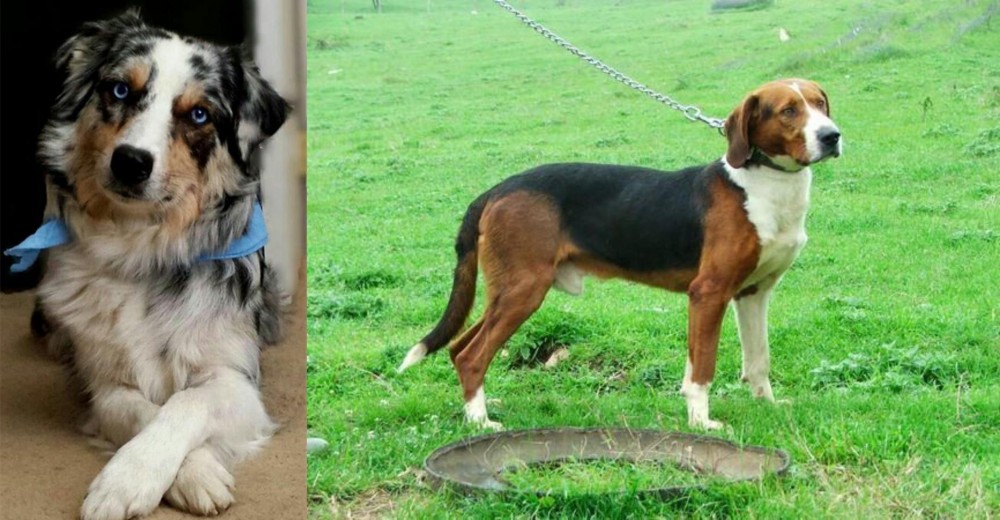 Australian Collie is originated from Australia but Serbian Tricolour Hound is originated from Croatia. Australian Collie may grow 15 cm / 5 inches shorter than Serbian Tricolour Hound. Both Australian Collie and Serbian Tricolour Hound are of same weight. Australian Collie may live 3 years more than Serbian Tricolour Hound. Both Australian Collie and Serbian Tricolour Hound has same litter size. Australian Collie requires Moderate Maintenance. But Serbian Tricolour Hound requires Low Maintenance
Australian Collie is originated from Australia but Serbian Tricolour Hound is originated from Croatia. Australian Collie may grow 15 cm / 5 inches shorter than Serbian Tricolour Hound. Both Australian Collie and Serbian Tricolour Hound are of same weight. Australian Collie may live 3 years more than Serbian Tricolour Hound. Both Australian Collie and Serbian Tricolour Hound has same litter size. Australian Collie requires Moderate Maintenance. But Serbian Tricolour Hound requires Low Maintenance
 The Koolie, as a breed we know today, originates from Australia. But, before they were breed and imported, they were the mix made of Britain smooth coated blue merle Collie and the Black and Tan Collie from the Highlands of Scotland. The Koolie came to Australia to work as a kennel dog since they are known as the working, farm dog that can adapt to any weather condition. They were bred to be agile and non-aggressive quiet herding dogs, and they have kept most of those good characteristics until today.
The Koolie, as a breed we know today, originates from Australia. But, before they were breed and imported, they were the mix made of Britain smooth coated blue merle Collie and the Black and Tan Collie from the Highlands of Scotland. The Koolie came to Australia to work as a kennel dog since they are known as the working, farm dog that can adapt to any weather condition. They were bred to be agile and non-aggressive quiet herding dogs, and they have kept most of those good characteristics until today.
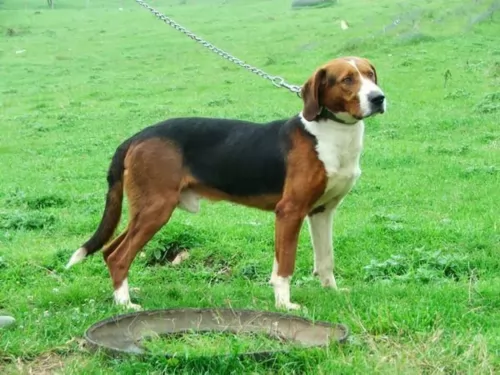 The Serbian Tricolour Hound was once known as the Yugoslavian Tricolour Hound. It’s a rare dog breed that you won’t find much outside of the Balkans.
The Serbian Tricolour Hound was once known as the Yugoslavian Tricolour Hound. It’s a rare dog breed that you won’t find much outside of the Balkans.
These dogs were bred for hunting in packs but in these more modern times they are more of a companion dog.
It is thought that the Serbian Tricolour Hound was a variant of the Serbian Hound until 1946 when a separate breed standard was established. It was recognized by the Federation Cynologique Internationale in 1961.
 Koolie is a medium bred. Their head is small, with a pointy jaw. Ears are pricked, semi-dropped or dropped. Their coat can be smooth or rough, short or medium length, always with the undercoat. The colours can be Red or Blue Merle, solid Red or Black, sometimes with minimal white or cream speckles. They are usually two-coloured or tricoloured, but some of them are actually one-coloured.
Koolie is a medium bred. Their head is small, with a pointy jaw. Ears are pricked, semi-dropped or dropped. Their coat can be smooth or rough, short or medium length, always with the undercoat. The colours can be Red or Blue Merle, solid Red or Black, sometimes with minimal white or cream speckles. They are usually two-coloured or tricoloured, but some of them are actually one-coloured.
Some Koolie have one or two blue, green or yellow eyes. Eye colour is, of course, affected by the gene that creates the coat pattern and eye colour as well.
They are athletic dogs, with fine bone structure but great stamina. Actually, they were breed to be like that – to work hard, be noticeable among the sheep, eat little and be loyal to one person.
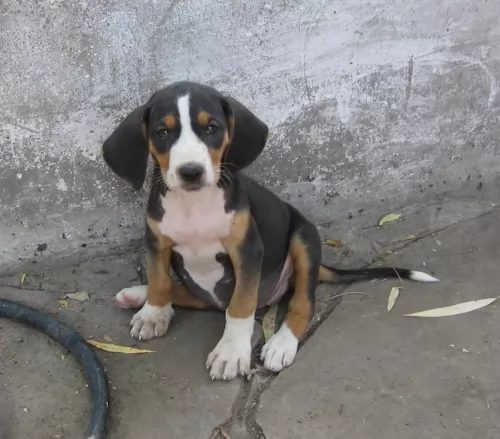 The Serbian Tricolour Hound is a medium sized dog standing at between 44 to 55cm in height and weighing in the region of 20 to 25kg.
The Serbian Tricolour Hound is a medium sized dog standing at between 44 to 55cm in height and weighing in the region of 20 to 25kg.
He is a strong, muscular, solidly built dog with a rounded skull and longish muzzle. The ears of this dog are long and floppy and the long, curved tail hangs down but is held high when the dog is excited.The dog has a short, glossy coat which is essentially a rusty color. There is quite a lot of black with some white on the coat too.
Loving and loyal, this dog was once used for hunting and he has learned to listen carefully to- and respond well to his owner.
He loves his human family and makes a great family pet. He gets on well with the kids, loving to take part in their games. He is intelligent and with training and socialization he is obedient, well balanced and well mannered.
Friendly and social, all he wants is to be with his human family, but even so he is better suited to life with a family who lives on a large property in the suburbs or countryside as opposed to living in the city.
 Koolie is naturally energetic, playful and affectionate so they are naturally very good to raise with children.
Koolie is naturally energetic, playful and affectionate so they are naturally very good to raise with children.
They are known as great obedience dog. They are very famous as the tracking dogs.
Some of them are successful as the rescue dogs, therapy dogs or educators for school children.
This is not a type of dog that will be alone in the house, wait for you and then be quiet while you rest. They need a great deal of activity and they are not such great choice for indoor life anyways. The best thing for them would be the large yard, with somebody home most of the time. They are great if raised in a family, with children and active owners. They will be great for a loner at the farm as well since that is in their blood. They need enough place to run, chase, play, rest on the sun and be active as they please. They get affectionate towards their families, but they will be accepting their new home when they are older just fine.
They are very good at learning. Intelligent, yes, but yet very silly and playful to do what is told all the time. They will surprise you with how quickly they will pick up the new trick but not feeling like doing it every time you would like them to. Everything is a play for them, so it would be best if you know how to play, be affectionate and friendly to become a good owner of this breed.
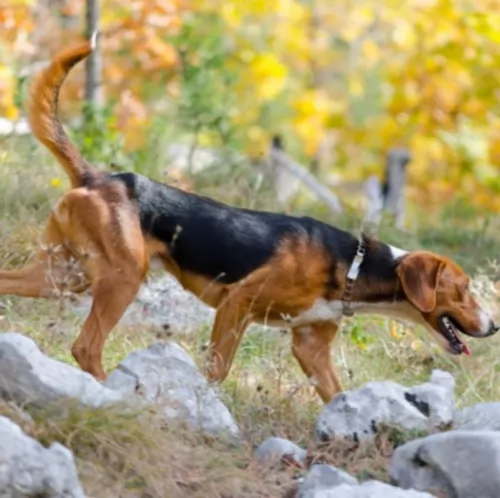 The Serbian Tricolour Hound is a loving, loyal, active, devoted breed that loves his human family, wanting to be involved in all the activities they’re involved in.
The Serbian Tricolour Hound is a loving, loyal, active, devoted breed that loves his human family, wanting to be involved in all the activities they’re involved in.
He is somewhat reserved with strangers but training and socialization helps to make him well behaved around them and it means you can take him with you wherever you go as he is well behaved.
These Serbian dogs make splendid pets, and if you take good care of yours, he will provide you with unconditional love.
 If you are careful enough, you will choose your Koolie form patiently chosen breeders, after checking the health history of the pup and the pup’s family. Advisable is to do these things in person and never to buy a Koolie from a pet shop.
If you are careful enough, you will choose your Koolie form patiently chosen breeders, after checking the health history of the pup and the pup’s family. Advisable is to do these things in person and never to buy a Koolie from a pet shop.
Sometimes, pups can be born blind or deaf pups. They have the great chance of joint problems because of their extreme activity. Their need to run, jump and play all the time may result in damage to cartilage and ligaments, especially since they are not aware of their age most of the time.
There is a chance that pup has skin allergies or immune system issues if they are growing on a farm near the chemicals used for plants, so be careful what kind of herbicide you use if you have a Collie.
In some rare cases, they suffer from seizers. If untreated, they can cause death. If you decide to take him to a regular vet check, you will have a happy and playful life together.
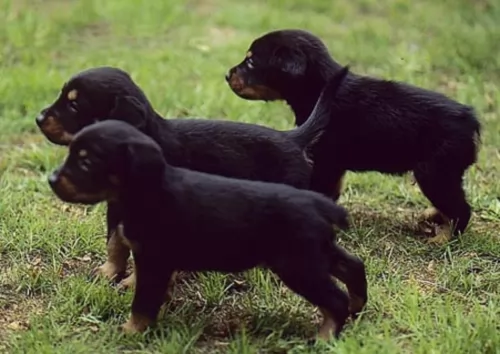 The Serbian Tricolour Hound is such a healthy dog breed and with the right nutrition and exercise can reach 12 to 15 years of age. He is a rare dog breed so there isn’t a whole lot of information available about his health.
The Serbian Tricolour Hound is such a healthy dog breed and with the right nutrition and exercise can reach 12 to 15 years of age. He is a rare dog breed so there isn’t a whole lot of information available about his health.
There are always going to be those common dog illnesses that many dogs succumb to. Some of them are hip dysplasia, cancer, skin problems and parasites.
With his floppy ears, check out the insides of his ears to ensure there are no signs of redness and ear discharge.
Hip dysplasia is a condition where parts of the hip joints don’t fit properly together. This creates a situation where there is abnormal wear and tear on the joints. It can lead to arthritis even and pain for your dog.
The tapeworm is a parasite spread to dogs but also to people and it is through the ingestion of infected fleas. You can often detect this when you discover parts of the worm crawling in your dog’s bowel movements.
Check your dog over for ticks and fleas too when you brush him as these can lead to other illnesses such as tick bite fever.
 Whether you choose canned food or dry food, treats as biscuits or left-overs, the quantity is the safest way of keeping the balanced diet for your Collie. They like raw meat and raw bones. Make sure not to feed them with cooked bones because they can do more harm than good.
Whether you choose canned food or dry food, treats as biscuits or left-overs, the quantity is the safest way of keeping the balanced diet for your Collie. They like raw meat and raw bones. Make sure not to feed them with cooked bones because they can do more harm than good.
Since Koolie coat can be very short with the undercoat or a bit longer with undercoat, bristle brushing every 3 or 4 days will be enough for them. Some of them like the water and some of them don’t and that is perfectly fine since there is no need for a regular bath.
Lots of activities and lots of love. They express their love all the time and you can learn a lot from them actually. They like raw bones and from-the-table delicious treats but make sure not to overfeed them.
Games that need them to be fast and think quickly. Running with them, driving a bike with them (but not on the leash!) would be a great fun for them. Why not leash? They are so playful and happy and they tend to jump and run to the side to chase a butterfly or catch the falling leaf.
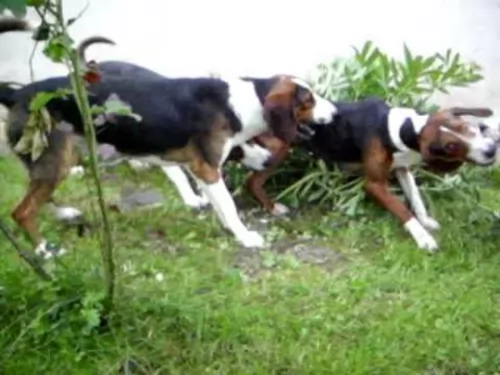 The short, shiny coat of the Serbian Tricolor Hound will require nothing more than a good brush twice a week to keep the coat nice and smooth. You can even take a damp cloth and wipe the coat over with it to remove dust.
The short, shiny coat of the Serbian Tricolor Hound will require nothing more than a good brush twice a week to keep the coat nice and smooth. You can even take a damp cloth and wipe the coat over with it to remove dust.
Provide your dog with a regular amount of exercise every day. Dogs become sad and unhealthy when they’re just stuck in the back yard and left on their own. Take him for walks each day and throw a ball for him to fetch. Simple little games like this will keep him happy as he loves to spend time with you.
Only the very best food is good enough for a dog. Dry kibble is excellent and convenient but try and feed your dog some home-made food too. Avoid spicy, exotic foods as this can upset your dog’s digestive system. Speak to your vet if you’re unsure how to feed your dog to ensure his good health and longevity.